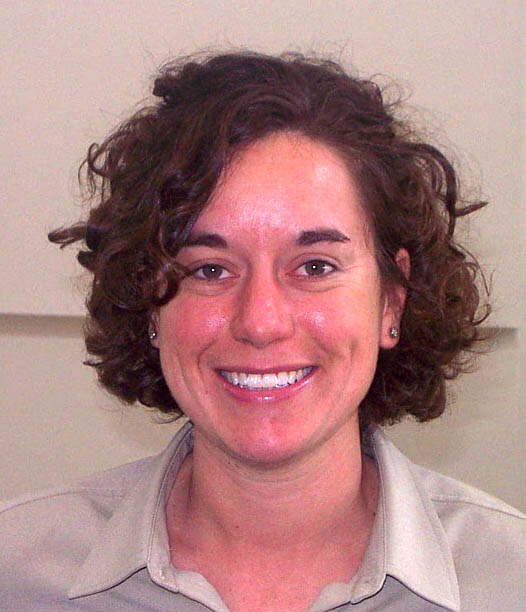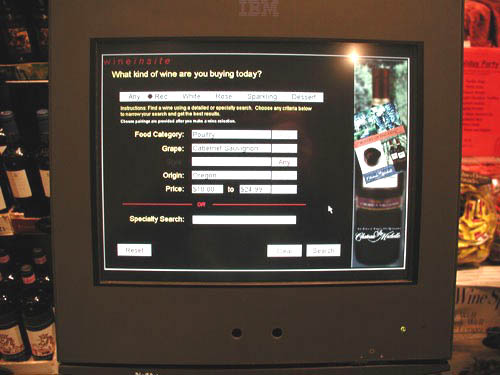Article
A kiosk startup story
Nascent kiosk company Wine Insite wraps up its initial trial program in the first installment of a continuing series.
April 9, 2002
Editor's note: Welcome to the first installment of a new series looking at the life of a start-up kiosk company. The company, Wine Insite, is developing a retail kiosk that will offer information and advice on wine selection. Based in Atlanta, the company is the brainchild of Lisa Allen, a 2001 MBA graduate at Emory University. Kioskmarketplace will report on Wine Insite's progress every few months.
ATLANTA -- Lisa Allen works two part-time jobs, plays soccer four days a week because it is more fun than going to the gym, and marvels at the five-figure signing bonuses her classmates received when they graduated from Emory University last year.
But Allen, who lists an MBA from Emory on her resume, did not enter Atlanta's challenging, but financially rewarding corporate world upon completing her studies. Instead, she is pursuing a quest that took shape almost by accident over the last five years.
Lisa Allen is a kiosk executive. Her company, Wine Insite, plans to deploy kiosks at grocery, deli, and other retail outlets. The kiosks will offer advice and information on wines and wine selection.
A fine arts major as an undergraduate, Allen's original career path included symphonies and ballets, not chardonnays and merlots. But her interest was piqued by a college friend who grew up in the wine industry. Allen moved to Dallas five years ago, intending to work in the area's fine arts community. Instead, she wound up at the Texas Wine and Grape Growers Association, where she was named executive director at age 24.
 |
Wine Insite founder Lisa Allen |
After leaving that organization, she took a position with eatZi's Market & Bakery in Dallas, working in management and consulting on merchandising and product initiatives. Her job at eatZi's got her thinking about kiosks as a method of delivering information.
"I spent so much time on the retail floor and could see how consumers were struggling to buy wines," she said. "I started asking myself how you could make it easier."
At the moment, Wine Insite is essentially a company in name only. Allen launched the company last year with $25,000 seed money donated by family members. The easy way would have been to go corporate, but Allen insists her way has been more enjoyable.
"I laugh about it because all my other MBA friends are not working for $10, $12 an hour," Allen said. "I didn't have the signing bonus or other perks that they got, but I wouldn't trade it for anything. It's been a lot of fun and a lot of learning."
Currently in the development stage, Wine Insite will need a lot of help and a fair dash of luck to succeed, especially since it is not the only company experimenting with wine-information kiosks. Allen knows this, but she is confident five years in the wine industry and an MBA have prepared her for the task at hand.
"I don't feel like I could be doing what I'm doing without my MBA," she said. "I could be doing it, but I'd be making lots of bad decisions. I'm on my own and I've got competition, so if I screw up I've blown it."
Ask and ye shall receive
One of the fundamentals Allen has grasped in her early months as a kiosk executive is that connections and courage are critical.
 |
Wine Insite's trial kiosk makes wine recommendations based on a variety of factors. |
Connections have been a big boost to Allen in gaining financial assistance and product placement. Her father, an oral surgeon, and mother, who handles the books for her dad's practice, provided a big chunk of her startup money. That enabled her to develop the software she needed for her initial test kiosk. Connections also helped her land a location for the first trial -- eatZi's has a location in Atlanta.
All she needed was an enclosure to house the unit. She received a break there when North Carolina-based computer services provider Kyrus Corp. put her in contact with IBM Corp., which provided her a NetVista kiosk enclosure for the trial. IBM initially showed no interest and Allen had forgotten she had contacted the technology conglomerate until a representative from Kyrus -- an IBM partner -- called and set up a meeting.
"I got my software developed (using a FileMaker program) and asked IBM if they'd help sponsor the trial," she said "It's amazing what you get if you ask for it. I asked them to donate equipment and sponsor my trial and they did it."
Mike Senn, Kyrus manager of business development, said companies such as Wine Insite are valuable for Kyrus in developing business for IBM, but also for testing products and concepts.
"At the end of the day Lisa is a customer, but she's also kind of a solution," Senn said. "For her, the next step will be to take her solution to IBM and achieve the StoreProven tag (IBM's compatibility program) with it."
Allen thought the hard part -- obtaining a kiosk -- was over. Then it was time to develop her company's logo. What was supposed to be the easy part became a laborious psychological experience.
"It was horrible, painful, and time consuming," she said. "I felt like I was making decisions for me and for all my future companies and I think it overwhelmed me. I was thinking `Is this what it should look like? Is that what it should look like?' I realized you've only got one chance to make a decision like this."
Test results
The four-month trial, which ended on April 10, gave Allen an opportunity to test her company's concept. Using a touchscreen monitor, customers could input what aspects of the wine selection process were important to them -- food pairings, grape varieties, style, origin, and price -- and receive information on the availability of wines at eatZi.
"Some of the search criteria have been utilized less than I anticipated," Allen said on April 9. "I thought food pairings would be more popular because it's right there for you. Price and origins have been utilized only 30 to 35 percent of the time. Â… People have really just said `I'm looking for red wine. I want to know what red wines this place stores.' "
The revenue model is based on a percentage of wine and related sales generated and tracked directly through the kiosk. The trial kiosk has not generated any revenue; Allen did not charge eatZI's because she wanted "unconditional support" for her project in its early stages.
The next step is developing a second trial program. Allen plans to tweak the kiosk based on data from the first trial, create a more sophisticated software system that can handle remote management functions, and launch a three- or four-store trial. She has talked to Costco about deploying the second test at their Atlanta warehouse locations, but no firm decisions have been made.
"I hope to get a deal solidified and developed in the next three to six months and have a trial that will last three months," she said.
Before any deal can be made, however, Allen needs more funds. Her startup money is about exhausted, and she anticipates needing $150,000 to $250,000 to launch phase two of Wine Insite.
The funds could come from a number of sources. Allen mentioned family and friends, but she is also considering strategic partnerships within the wine industry or angel investors -- entrepreneurs who invest in companies but do not expect management control in return. At this point, Allen said she would prefer angel investing over traditional venture capital funding.
"They want less control and it's a little quicker to get a deal done," she said of angel investors.
And having been on her own for a year, Lisa Allen is very comfortable being in control.







